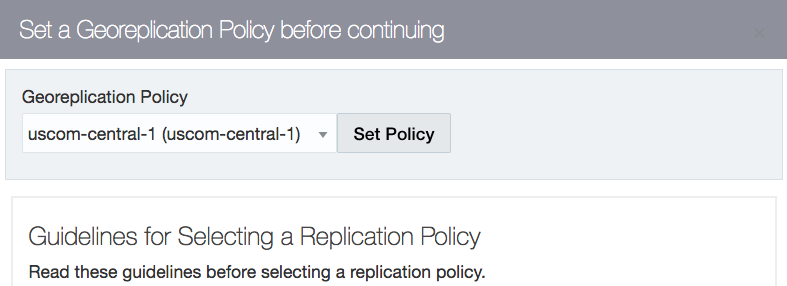Configuring the Oracle Storage replication policy should be step number zero if you start in the Oracle cloud with any service. I cannot stress this often enough. Many services such as DB as a service or Java Cloud service will not work without it. Even ACCS – a much newer and higher level PaaS service – will not work unless you set this storage policy.
- For now: go and set the policy. I got into all kind of trouble trying without. Trust me, you won’t have the time for this.
- To make cloud services such as JCS or ACCS work it is not so much important how you set the replication policy, it it just important that you set it. Functionally of course, there is a big difference if you data will be replicated asynchronously to another data center or not.
- IMHO this could be improved by Oracle to improve the overall OPC customer experience. There is no reason why there could not be a default value, that makes other PaaS services work correctly.
From the official Documentation
Guidelines for Selecting a Replication Policy
Read these guidelines before selecting a replication policy.
Oracle provides several replication policies. Broadly, they belong to one of the following types:
- Policies that have no georeplication: These policies specify only the primary data center (DC) that hosts your service instance.All read and write requests go to the primary DC, always. If the primary DC is unavailable, then the requests fail. Such a policy may be adequate if you have standard data-durability requirements and if an occasional failure of read requests (when the primary DC is down) is acceptable.
- Georeplication policies: These policies specify a primary DC that hosts your service instance as well as a geographically distant, georeplication DC.Write requests that you send to the global namespace URL are routed to the primary DC. Data that you write is replicated automatically, but asynchronously, to the georeplication DC. The primary and secondary DCs are eventually consistent. If the primary DC is unavailable, then write requests fail with the 403 — Forbidden error, but read requests are routed to the georeplication DC. When the primary DC is available again, requests to the global namespace URL are routed to the primary DC. You’ll be billed for the sum of the capacities used in both DCs and for the data transfer from the primary to the georeplication DC. A policy that has a georeplication DC is ideal if you have advanced durability requirements for your data or if read requests must succeed always regardless of the state of the primary DC.
For faster data transfer between your other Oracle Cloud services and Oracle Storage Cloud Service, consider selecting a policy with a primary DC that hosts your other services that use Oracle Storage Cloud Service the most. When selecting the replication policy for your service instance, keep in mind any security, legal, and regulatory requirements that may apply to your data.


 Oracle WebLogic Server 12c Book
Oracle WebLogic Server 12c Book Oracle Middleware and Cloud Computing Book
Oracle Middleware and Cloud Computing Book
[…] Good news is, that you can fix it easily by setting the replication policy for the Storage Service. […]